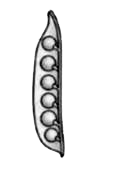Complete Solutions to TOPIC-2 SEXUAL REPRODUCTION ( SHORT ANSWER TYPE QUESTIONS I) of chapter REPRODUCTION IN ORGANISMS of Class 12 book with complete answers and questions
| Class 12 | BIOLOGY |
| Chapter | REPRODUCTION IN ORGANISMS |
| OSWAAL PUBLICATION | TOPIC-2 SEXUAL REPRODUCTION ( SHORT ANSWER TYPE QUESTIONS I) |
| Number Of Questions | 16 |
| Academic Year | 2023-24 |
Give reasons for the following:
a. Compared to internal fertilization the external fertilization is disadvantageous to the animal.
b. Chances of survival of young ones are more in vivparous than in oviparous.
View SolutionWhat is parthenogenesis? Give two examples.
View SolutionDefine 'oestrus' and 'menstrual cycles.
View SolutionDistinguish between homogametes and heterogametes.
View SolutionDifferentiate between oviparous and viviparous animals with a suitable example for each.
View SolutionWhich of the followings are monoecious and dioecious organisms?
a. Earthworm________________
b. Chara______________
c. Marchantia__________________
d.Cockroach__________________
View SolutionWhat do the following parts of a flower develop into after fertilisation?
a. Ovary______________
b.Ovules__________
View SolutionMention the unique flowering phenomenon exhibited by Strobilanthus Kunthiana. (NeelaKurinji)
View SolutionIn certain simple plants, why are male gametes produced in large numbers as compared to the female gametes? It is applicable in animals also? Yes or not.
View SolutionWhat are the three major phases in the life cycle of an organism? Define each phase.
View SolutionDifferentiate the following organisms on the basis of isogamy and heterogamy-Monocytis, Plasmodium, Human beings, Cladophora.
View SolutionDefine external fertilization. Mention its disadvantages.
View SolutionDifferent between a stamina and a pistillate flower, Give the term for this condition of flower.
View SolutionMention the different stages of sexual reproduction.
View SolutionDifferentiate between seasonal breeders and continuous breeders.
View SolutionIn the figure given show, mark the ovule and pericarp.

View Solution
TOPIC-2 SEXUAL REPRODUCTION ( SHORT ANSWER TYPE QUESTIONS I) questions and complete solutions for chapter REPRODUCTION IN ORGANISMS of OSWAAL BIOLOGY (KANNADA ENGLISH) of Class 12
All Exercises from OSWAAL PUBLICATION Class 12 BIOLOGY REPRODUCTION IN ORGANISMS
- TOPIC-1 LIFE SPAN AND ASEXUAL REPRODUCTION ( LONG ANSWER TYPE QUESTIONS II)
- TOPIC-1 LIFE SPAN AND ASEXUAL REPRODUCTION ( MULTIPLE CHOICE QUESTIONS II)
- TOPIC-1 LIFE SPAN AND ASEXUAL REPRODUCTION ( SHORT ANSWER TYPE QUESTIONS I)
- TOPIC-1 LIFE SPAN AND ASEXUAL REPRODUCTION ( SHORT ANSWER TYPE QUESTIONS II)
- TOPIC-1 LIFE SPAN AND ASEXUAL REPRODUCTION (VERY SHORT ANSWER TYPE QUESTIONS)
- TOPIC-2 SEXUAL REPRODUCTION ( LONG ANSWER TYPE QUESTIONS II)
- TOPIC-2 SEXUAL REPRODUCTION ( MULTIPLE CHOICE QUESTIONS II)
- TOPIC-2 SEXUAL REPRODUCTION ( SHORT ANSWER TYPE QUESTIONS I)
- TOPIC-2 SEXUAL REPRODUCTION ( SHORT ANSWER TYPE QUESTIONS II)
- TOPIC-2 SEXUAL REPRODUCTION (VERY SHORT ANSWER TYPE QUESTIONS)